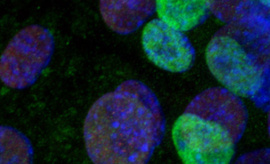Clinical Validity of HPV Circulating Tumor DNA in Advanced Anal Carcinoma: An Ancillary Study to the Epitopes-HPV02 Trial
Abstract
Purpose:
Human papillomavirus (HPV) is found in 90% of squamous cell carcinomas of the anal canal (SCCA). We investigated the clinical validity of HPV circulating tumor DNA (ctDNA) detection in patients enrolled in the Epitopes-HPV02 trial that demonstrated the efficacy of docetaxel, cisplatin, and 5-FU as first-line chemotherapy in advanced SCCA.
Experimental Design:
According to the protocol, serum samples were collected before chemotherapy and on completion of chemotherapy. HPV16 ctDNA was quantified by droplet digital PCR (ddPCR) and correlated with prospectively registered patient characteristics and outcomes. A landmark was set at the time of chemotherapy completion for postchemotherapy progression-free survival (PFS) analyses.
Results:
Among 57 patients with HPV16-related advanced SCCA, HPV ctDNA was detected in 91.1% (95% confidence interval, 81.1–96.2) of baseline samples. Baseline HPV ctDNA levels were not associated with any patient characteristics; baseline ctDNA level below the cutoff obtained by AUC (area under the curve) was associated with a longer PFS (HR = 2.1; P = 0.04). Among the 36 patients who completed 5 months of chemotherapy, residual HPV ctDNA was detected after chemotherapy in 38.9% of patients. Residual HPV ctDNA detected at chemotherapy completion was associated with shorter postchemotherapy PFS (median PFS 3.4 months vs. not reached; HR = 5.5; P < 0.001) and a reduction of 1-year overall survival rate (OR = 7.0; P = 0.02).
Conclusions:
This prospective study in advanced SCCA demonstrated a significant prognostic impact of HPV ctDNA level before first-line chemotherapy and HPV ctDNA negativity after chemotherapy completion. With a limited cost and short turnaround, this assay is a promising tool to optimize the therapeutic management of SCCA.
See related commentary by Morris, p. 2030

